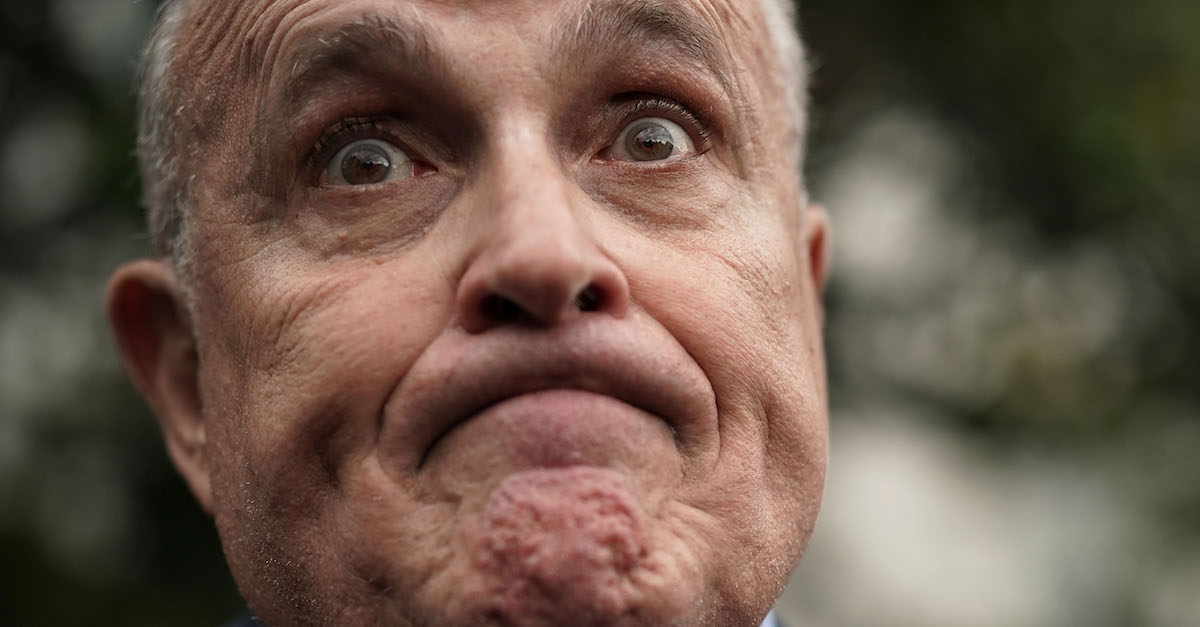
President Donald Trump‘s attorney Rudy Giuliani, ready and raring to take on 2019’s legal troubles, still hasn’t fully grasped 2018’s developments, if radio comments uttered Wednesday are any indication.
The latest “Rudy is great, but Rudy is Rudy” moment, this one dealing with the Moscow Project, is an extremely gourmet word salad. The comments, which were apparently made during a Fox Radio interview, revealed that Giuliani knew there was a Moscow Project, denied that there was a Moscow Project and didn’t know how long this non-thing went on.
https://twitter.com/AaronBlake/status/1080544427125493767
“I knew there was a Moscow project. I still don’t know how long it went, and I don’t consider it a Moscow project,” the quote attributed to Giuliani reads.
Indeed, this is a remarkable thing to say when you consider that ex-Trump attorney Michael Cohen recently pleaded guilty to lying to congressional investigators about how long discussions of the Moscow Project went on. In case you missed it, the Moscow Project was a proposed Trump Tower in Moscow that Russian President Vladimir Putin potentially stood to benefit from.
Cohen pleaded guilty to lying to Congress about these negotiations for a possible Trump real estate deal in Moscow. Cohen said that his claim that negotiations ended in January 2016 was a lie told to be consistent with Trump’s political messaging and out of “loyalty” to Trump. Instead, Cohen said, discussions about the Moscow Project continued into June 2016.
Donald Trump Jr.‘s testimony supported that. Trump Jr. said that he believed his father signed a letter of intent and said “yes” in response to the following question: “It’s been reported that in late 2015 or 2016 when now President Trump was running for office the Trump Organization was pursuing a plan to develop a massive Trump Tower in Moscow. Is that accurate?”
The point is, a high-profile Cohen guilty plea and testimony from the president’s son both give Giuliani an answer to “how long [the Moscow Project negotiation] went [on].” The contradiction between knowing of a Moscow Project and not considering it a Moscow Project is otherwise plain to see.
This wasn’t the only specious claim. Giuliani claimed that former Trump attorney John Dowd has expressed regret of “cooperating so much” with Special Counsel Robert Mueller.
“John Dowd says he – he regrets, now, cooperating [with Mueller] so much, because they double-crossed him,” Giuliani said.
Dowd, however, unlike former White House counsel Ty Cobb, was one of the voices who repeatedly advised against cooperating with Mueller. Dowd resigned from his post in March:
Dowd was reportedly growing frustrated that Trump wasn’t heeding his legal advice. Dowd, who led Trump’s legal team, has been against the idea of the president sitting down for an interview with Special Counsel Robert Mueller, fearing the prosecutors might try to trip him up and catch him in a contradiction. Trump, however, has been outspoken regarding his desire to meet with Mueller.
A confidential memo with Dowd’s name on it that was sent to Robert Mueller at the end of Jan. 2018 was pretty clear about that version of Trump’s legal team’s thoughts about a Mueller interview.
As you know, under our system of government, the President is not readily available to be interviewed. Ample academic and jurisprudential material supports this important principle. Moreover, as we have indicated in our meetings, we are reminded of our duty to protect the President and his Office. Thus, in deciding whether to advise the President to be interviewed, we are guided by the controlling law in this Circuit, In re Sealed Case (Espy), 121 F.3d 729 (D.C. Cir. 1997) (the “Espy” case), that those seeking information from the President must “demonstrate with specificity why it is likely that the subpoenaed materials [here, his testimony] contain important evidence and why this evidence, or equivalent evidence, is not practically available from another source.”
One month after Dowd left, Giuliani became the primary messenger for Trump in the media and launched a maybe-we-will-maybe-we-won’t do a sit-down interview campaign that continues until the present day.
An Associated Press story from November went so far as to say that Giuliani’s dragging out of Mueller interview drama was all part of his strategy, which, again, John Dowd was not a part of:
As Rudy Giuliani joined Trump’s legal team in April, the White House settled into a new strategy [emphasis ours]: Drag out the interview drama for months, and use that time to ratchet up attacks on Mueller’s credibility and complaints about the cost and time of the probe, according to the officials and advisers familiar with the strategy.
Giuliani led the charge. His scattershot arguments sometimes frustrated others in the White House, as he frequently moved the goalposts as to what would be required to have an interview. But the effect was to ensure the process would drag out longer.
With this in mind, consider that Giuliani said on Dec. 16 that a Mueller interview would happen only “over [his] dead body.” On Dec. 27, Giuliani said negotiations over a Mueller interview were “still open.”
[Image via Alex Wong/Getty Images]
This is an opinion piece. The views expressed in this article are those of just the author.